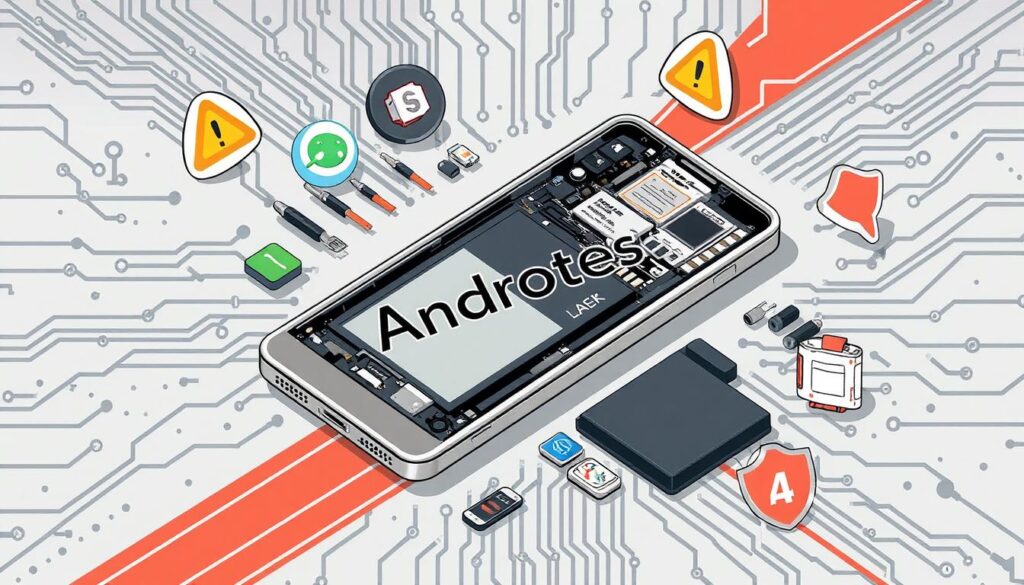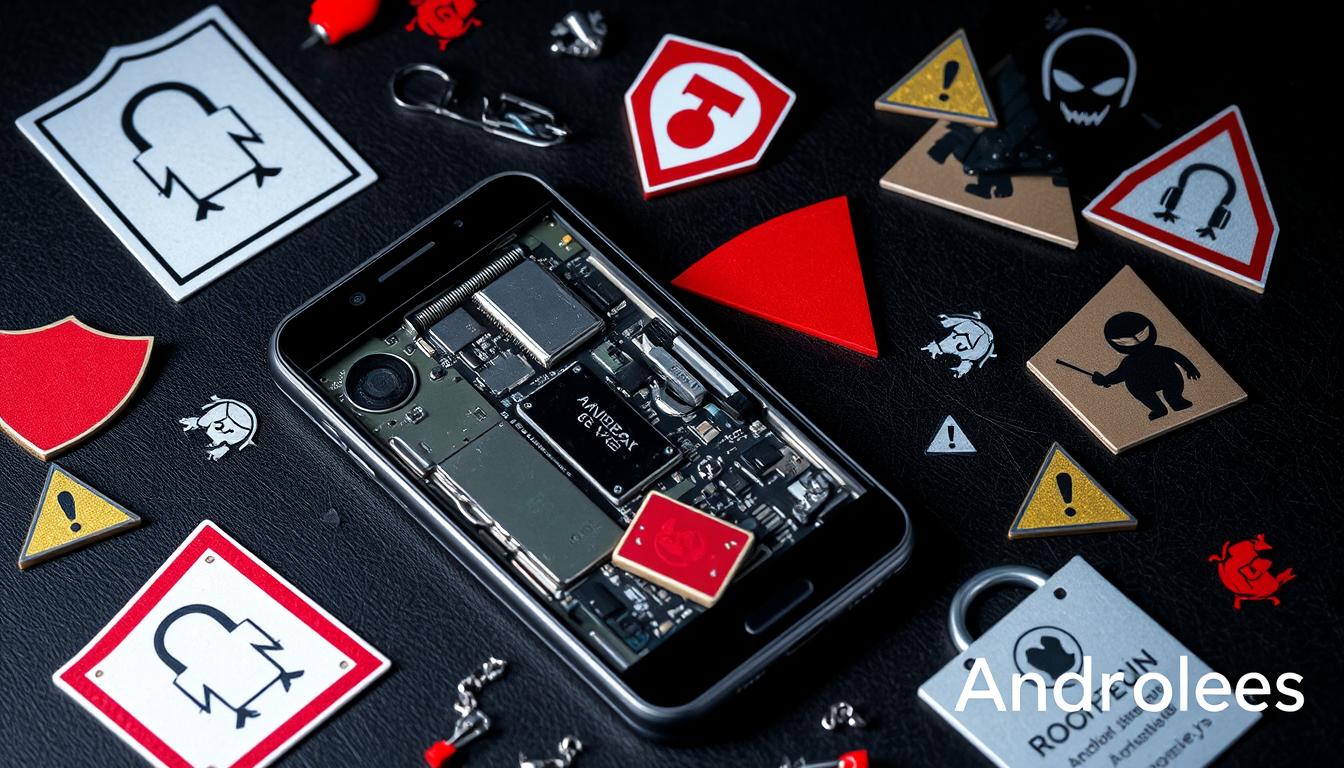Did you know over 80% of smartphone users have rooted their devices? This action unlocks customization and features but also risks your phone’s safety. We’ll explore the downsides of rooted phones to help you decide if the benefits are worth it for you.
Rooting your Android device gives you more control and flexibility. But, it also brings big risks. These include security issues, malware threats, app problems, and performance drops. Knowing these risks is key when you’re thinking about customizing your phone.
Understanding the Risks of Rooting Your Phone
Rooting opens up an Android device to security issues and risks. The built-in security is bypassed making the device prone to malware and intrusion by various hackers. This compromises the ownership of the property and other incriminating evidence available.
Root Android Security Issues
Rooting disables default security features and other restrictions imposed by the android. It enables change in system files which may be convenient. However bountiful opportunities are also presented to hackers who can exploit security shortcomings to access the device.
Rooted Phone Risk
Rooted phone faces much enhanced security risk. Any malicious actor can easily siphon off data, either track the person’s activities, or even operate the smart phone from a far off distance. Rooting a phone exposes it as it lacks the advanced security features from Google.
Understand the risks involved before you proceed to root Android. Make sure that your privacy and data security are protected.
Malware Threats and Data Loss Risks
Rooting your smartphone could expose your phone to malware risks. These risks can endanger your privacy. Rooted devices are less protected than stock Android, hence they are prey to many viruses.
That viruses can compromise your data or deceiving people. The risk of deploying malware in a rooted phone is very high.
Rooting also heightens the chances of losing data. With more permission to modify the system files, the chances of misplacing or damaging an essential file are high. This would mean loss of pictures, files and even bank account records.
Rooted Phone Malware Threats
- Increased risk of malware infections that can steal your personal data
- Vulnerability to financial fraud and cybercriminal activities
- Potential for remote access and control of your device by hackers
| Threat | Impact |
|---|---|
| Data Theft | Stolen personal information, financial data, and sensitive documents |
| Financial Fraud | Unauthorized access to your online accounts, leading to monetary losses |
| Remote Control | Hackers gaining full control of your device, compromising your privacy and security |
Before rooting your phone, consider the risks. These include malware threats and data loss. Protecting your personal information and keeping your device stable should be your top priorities.
Rooted Phone Disadvantages
Rooting an Android phone has advantages like having more control and customization. Still, it also comes with certain cons. One major con is the chances of losing the warranty.
Rooting a device also destroys its manufacturers’ warranty. As a result, Trade ins and repairs can be a real challenge if you ever have an issue with the device. It becomes a major concern especially if it is a new phone and you are worried about the hardware problems.
Rooted phones have some cons too, such as:
- Increased danger of malware attacks and exposure to security threats
- Some applications may not run and software updates cannot be carried out because of incompatibility issues
- The performance and stability of the device may be affected adversely
- It becomes difficult to revert the settings of the phone back to what it was when bought
These problems might outweigh the benefits of rooting, if you’re not experienced or rely on your phone on a daily basis. Before rooting your rooted phone, weighing the risks and consequences is a must on your part.
| Disadvantage | Description |
|---|---|
| Voided Warranty | Rooting your Android device typically voids the manufacturer’s warranty, making it more difficult to get repairs or replacements if something goes wrong. |
| Security Risks | Rooting your phone can increase the risk of malware and security vulnerabilities, potentially exposing your personal data to unauthorized access. |
| Compatibility Issues | Rooting your phone can lead to compatibility problems with certain apps and software updates, limiting the functionality of your device. |
| Performance Concerns | Rooting your phone may result in decreased device performance and stability, leading to slower response times and possible crashes or freezes. |

Compatibility and Performance Issues
Rooting your phone can lead to conflicts with applications and services. The reason is, applications may be written for the default state of security so some apps will crash or work poorly which makes the phone rather unstable.
Consequently, Rooting your phone can impact performance. You may notice a longer time to open apps, a faster battery consumption, and so on.
Rooted Phone Application Issues
Rooting, in other words, modifies the base Operating System of the phone. This can lead to usage of certain applications such as banking apps to be difficult or even impossible. This is a huge drawback since several critical features and services on the phone become inaccessible.
Rooted Phone Generalization Problems
With the rooting, the phone is prone to crashes. The rooted devices can be slow or odd acting. With changes to the OS, some software and hardware options become dysfunctional which loses reliability from the phone and is quite annoying.
| Issue | Impact |
|---|---|
| Rooted phone app compatibility issues | Reduced functionality, app crashes, and limited access to essential services |
| Rooted phone stability problems | Frequent system crashes, freezes, and overall device unreliability |
| Rooted phone performance degradation | Slower app loading times, reduced battery life, and other performance-related issues |

Conclusion
Rooting your smartphone isn’t a decision that is easy to make. It does unlock a whole new level of features and capabilities. However, there are some disadvantages that come along such as security vulnerabilities and malware.
The first thing I would recommend you to be cautious about while considering rooting is to have a look at the downside. You might face the problem of warranty, which most of the time gets violated, data loss during the process and then many apps and other services cease to work. These can be preventable but only if you are ready.
This depends on the individual’s requirements. If it is the missing features that seem to be an advantage then go for it. However for the average person, the consequences would simply be far too risky. Only do it if you are fully aware of what it entails. Otherwise avoid root access altogether.
FAQ
What do hackers and malware do on a rooted device?
What are the risks of fraud and cybercrime due to rooted phones?
What are the pros and cons of having your device rooted?
What issues can I face after rooting where compatibility and performance is the main focus?

I’m a writer at Android Authority and Androidees with a keen focus on current news, wearables, how-to guides, and evergreen content.




